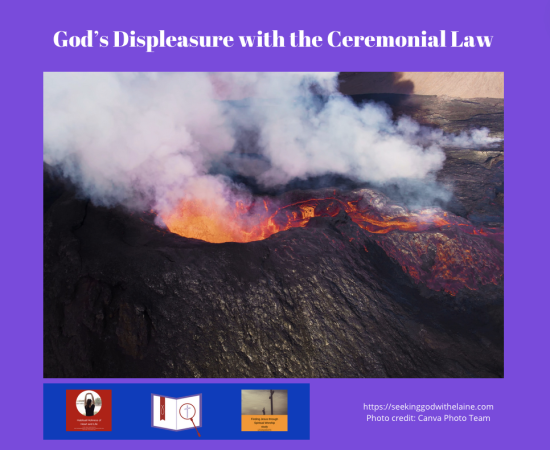In the last devotion, we saw that the ceremonial laws didn’t work. This devotional reading looks at how that displeased God — and what didn’t.
Nuggets
- The ceremonial laws could take us only so far because Jesus hadn’t completed the Plan of Salvation, and we didn’t understand that.
- God didn’t see the sacrifices being offered to worship Him.
- God wants us to perform sacrifices His way, not the way we want to do.

Here at Seeking God with Elaine, we’ve been looking at sacrifices and laws in the Ceremonial Law series in the Finding Jesus in Spiritual Worship study. We’ve contrasted the two and saw why the ceremonial law didn’t work.
But wouldn’t you think that God would have “gotten it right” the first time? Why was His plan always to have Abraham’s covenant to switch it to Jesus’ covenant?
And didn’t this failure of the law increase God’s wrath? Why was God displeased with the law?
Let's Put It into Context
To read devotions in the Habitual Holiness of Heart and Life theme, click the button below.
Here is a running list of nuggets for the theme.
Devotions in the Finding Jesus through Spiritual Worship study
Here is a running list of nuggets for the study.
The foundation of this series is Menander and Charnock’s Spiritual Worship.
Resource
We are going to be looking at the verses in a different order than Charnock presented them.
Taking Us Part Way
“God gave the promises to Abraham and his child. And notice that the Scripture doesn’t say ‘to his children,’ as if it meant many descendants. Rather, it says ‘to his child’ — and that, of course, means Christ” (Gal. 3: 16-17 NLT)
The ceremonial laws could take us only so far because Jesus hadn’t completed the Plan of Salvation.
Okay, in this first section, I wasn’t sure Charnock spoke English. Yes, he wrote it in English — it was Greek to me. Plus, he didn’t give us a verse to steer us where he was heading.
What am I having trouble understanding? Charnock wrote, “Neither are they hindered spiritual affections; because the people sunk down to the things themselves, and refused to perceive their spiritual intent.”
Resource
Let’s figure this out. The they Charnock is talking about is the ceremonial laws. So, he is saying the ceremonial laws are not a hindrance to spiritual awareness. But we make them hindrances because we latch onto them and don’t see their purpose.
What was their purpose? We’ve already said that one purpose was to show we couldn’t save ourselves. We need Jesus as our Savior and Redeemer.
Another purpose was to set Israel apart from the other nations. Their ceremonial laws showed that they were God’s people.
Until Jesus came, people needed to show that they were worshiping God.
Something just flitted through my mind. I may be totally off track here, but here goes.
Sanctification is all about growth. Sanctification is the transformational process of the mind, body, and soul, which begins with regeneration; gradually changes our nature and morals through the promptings of the Holy Spirit; and ends with perfected state of spiritual wholeness or completeness.
- Regeneration is being changed from spiritually dead to spiritually alive and the internal new birth and requickening that God brings about through the work of the Holy Spirit to give us new character.
- Spiritual death is the separation from God that occurred as a consequence of Adam and Eve’s original sin.
- The spiritually alive are those who have ABCDed, so they are no longer separated from God.
- Spiritual death is the separation from God that occurred as a consequence of Adam and Eve’s original sin.
- Perfection means we reach a state of maturity because the combination of the spiritual graces form, when all are present, spiritual wholeness or completeness — holy, sanctified, and righteous.
- Spiritual graces are worldly morals that have been submitted to God to further His kingdom instead of enhancing this world.
- Sanctified means to be set free from sin.
- Righteous means we are free from sin because we are following God’s moral laws.
The ABCDs of Salvation
If you have not become a believer in Christ, please read through the
Plan of Salvation and prayerfully consider what God is asking you to do.
A – admit our sins
B – believe His Son Jesus is our Redeemer
C – confess God as Sovereign Lord
D – demonstrate that commitment by making any changes needed in our lives to live the way in which God has called us
The Disciple’s Job Description
Glossary
Maybe the ceremonial laws were for the milk babies, and spiritual worship is for the steak adults.
No, not necessarily for individual people, but for the Church as a whole. It couldn’t be a Church until Jesus came.
So, Abraham, Moses, David, and all the rest had to really rely on the things-not-seen part of faith (Heb. 11: 1). They were only babies because the Plan of Salvation hadn’t come to fruition yet.
But they needed the spiritual milk to get to the spiritual steak. This is the same concept as sometimes we have to sin to realize what obedience and submission are.
Ritenbaugh reminded us that there were three things needed so sacrifices could be performed: the temple, the altar, and the priest. The priest could be interchangeable. The temple and the altar couldn’t.
God allowed the temple and altar to be destroyed and the priests scattered so that we wouldn’t focus on the ceremonies. God wants us to focus on our walk with Him.

Remember, Jesus said He wasn’t doing away with the law. That means we have to live by the moral law. Its principles still apply.
How? Rittenbaug told us. He wrote “Those laws that define sin, which guide us in the way of God, are just as binding as they ever have been, and they will remain so because God is using them to prepare us to live at one with Him and His Family.”
Resource
The laws show us what sin is. It does not, however, grant us righteousness.
We still make sacrifices today for God. They are just different sacrifices — not animal sacrifices.
“And so, dear brothers and sisters, I plead with you to give your bodies to God because of all he has done for you. Let them be a living and holy sacrifice — the kind he will find acceptable. This is truly the way to worship him” (Rom. 12: 1 NLT).
Hey, that is in our job description!
The Disciple’s Job Description
Complete Job Description
Bottom line is we cannot have spiritual worship if we didn’t have the ceremonial laws. That tells me that God isn’t displeased with His laws since we had to have the ceremonial laws to show the need for spiritual worship.
What God is displeased with is our observance of them.
Taking Us away from God
“I want you to show love, not offer sacrifices. I want you to know me more than I want burnt offerings” (Hos. 6: 6 NLT)
God didn’t see the sacrifices being offered to worship Him.
No, God didn’t have a problem with the original intent. The original intent was to worship Him. They were to show the coming sacrifice of Jesus.
Originally, there was no difference between mercy and sacrifice. Pusey explained it this way. He wrote, “For, if they were united, they would not be contrasted.”
Resource
Oh, we know from Pastor Steve’s What Is the Purpose of the Church? devotion that people can have differing opinions and still be unification. We aren’t talking subjugation here.
To read a related devotion, click the button below.
What I see it as saying is our love for God and the sacrifices we give to worship Him have the same intent as our love for others. We can’t say that our only sacrifice for God is serving others.
That makes serving others more important than serving God. That was not God’s intent.
“Jesus replied, ‘The most important commandment is this: “Listen, O Israel! The Lord our God is the one and only Lord. And you must love the Lord your God with all your heart, all your soul, all your mind, and all your strength.” The second is equally important: “Love your neighbor as yourself.” No other commandment is greater than these’” (Mk. 12: 29-31 NLT).
Loving God is the greatest commandment. Others come second — yes, a very close second — but second. The relationship has to be preserved.
Glossary
But there is so little area between the two that equally important really means equal.
I think Hutcheson described it the best. He wrote, “His ‘not desiring sacrifice’ is not to be understood simply, as if the Lord did not approve, even of the external performances which were enjoined by Himself; but comparatively, that He desired moral duties more than burnt-offerings. To which may be added, that in some cases, when moral duties come in competition with ceremonials, the Lord doth not desire ceremonials at that time, but moral duties.”
Resource
Don’t read that to say we can break one of God’s laws to perform our moral duties and equate those to serving others. We cannot condone sin as a way of loving others.
Burroughs made a great distinction. He didn’t define ordinances, but the definition we use is ordinances are an expression of the disciples’ obedience. Baptism and the Lord’s Supper are ordinances. (I need to rewrite that, don’t I?)
The description Burroughs used for duties was basically the same way Jesus did. “… ‘give to Caesar what belongs to Caesar, and give to God what belongs to God’ …” (Mk. 12: 17 NLT).
But Burroughs added a caveat. He wrote, “… which we should have been required to [fulfill] if there had been no written law in relation to them. By instituted duties understand those which, if God had not revealed them, would have had no claim on us.”
Our duties to God does not have that caveat. Burroughs wrote, “Natural duties refer to attributes in God’s nature and character, instituted, to the expression of His will.”
Resource
Our duties to God are based on Who He is.
Burroughs did list some limitations on sacrifices.
- The sacrifices have to be made within the spirit.
- The duties to others do not make atonement for our sins.
- The sacrifices must be done God’s way, not whatever way we want to do them.
Why is mercy better than sacrifice? Mercy is one of the attributes of God. It is tied in with His goodness.
Our sanctification is all about becoming as He is. That includes being merciful as He is.
Taking Us the Meaningless Way
“‘The multitude of your sacrifices — what are they to me?’ says the Lord. ‘I have more than enough of burnt offerings, of rams and the fat of fattened animals; I have no pleasure in the blood of bulls and lambs and goats. When you come to appear before me, who has asked this of you, this trampling of my courts? Stop bringing meaningless offerings! Your incense is detestable to me. New Moons, Sabbaths and convocations — I cannot bear your worthless assemblies. Your New Moon feasts and your appointed festivals I hate with all my being’” (Isa. 1: 11-14 NLT)
God wants us to perform sacrifices His way, not the way we want to do.
I love these verses. How many times do we think more is better?
God doesn’t look at it that way.
We have to put these verses into context. Hambleton helped us with that. He wrote, “So, with regard to the other rites, when the Jews would substitute them for true religion, then they became an object of aversion to God.”
Resource
You know, God doesn’t want us to go to church because that is just what we do every Sunday morning. He especially doesn’t want us to go just to have fellowship with the other attendees.
God wants us to go to church to meet Him. While we are communing with Him, we are to be worshiping Him.
Remember, our whole study is on spiritual worship. Hambleton had a great observation. He wrote,
“Worship offered to the Divine being must have some correspondence to His nature, and accordance with His will and Word. If God had a body, and were not a Spirit, then a religion of bodily exercise might serve without any regard to the inward state of the worshipper’s mind and heart. But God has no corporeal form, and therefore bodily service, without spiritual worship, is no worship at all.”
Resource
We can’t just worship through our actions. We can’t just be a good person. We can’t just do good deeds to others.
We have to worship God in spirit and in truth. Kingsley told us what that looks like. He wrote, “To adore God for His goodness, and to pray to Him to make us good, is the sum and substance of all wholesome worship.”
Resource
And that means really worship. Not just show up. Worship.
It goes back to our hearts being right. Hambleton tied it back to what Charnock was talking about.
- “No, a true Jew is one whose heart is right with God. And true circumcision is not merely obeying the letter of the law; rather, it is a change of heart produced by the Spirit. And a person with a changed heart seeks praise from God, not from people” (Rom. 2: 29 NLT).
- “And the LORD your God will circumcise your heart and the heart of your offspring, so that you will love the LORD your God with all your heart and with all your soul, that you may live” (Deut. 30: 6 ESV).
We have to praise God for Who He is and ask to be made like Him.

Making the Connections #1
Sacrifices were a compensation for sin. Unfortunately, the Jewish sacrifices probably didn’t touch their inward being. We know the animal blood can’t cleanse our consciences.
The sacrifices prepared the way for Jesus’ final sacrifice of His shed blood. It showed them His sacrifice could.
We need Jesus’ sacrifice because our sins are offensive to God.
Making the Connections #2
God isn’t displeased with the laws themselves. He is displeased with our keeping of them.
We don’t.
But then, God always knew we couldn’t and wouldn’t. They showed us our need for Jesus.
God isn’t displeased at that.
How Do We Apply This?
- Ask God to create in us a clean heart.
- Don’t pretend to make sacrifices.
Follow God’s Will in making the sacrifices. - Make the inward sacrifices.
- Show mercy.
- Get our purpose of mercy right.
- Circumcise our hearts.
Resource
Father God, we worship You for Who You are. We thank You that You have sent Your Son so that we can be restored to You. Lord, change us so that we are like You. Amen.
What do you think?
Leave me a comment below (about this or anything else) or head over to my Facebook group for some interactive discussion.
If you don’t understand something and would like further clarification, please contact me.
If you have not signed up for the email providing the link to the devotions and the newsletter, do so below.
If God has used this devotion to speak with you, consider sharing it on social media.